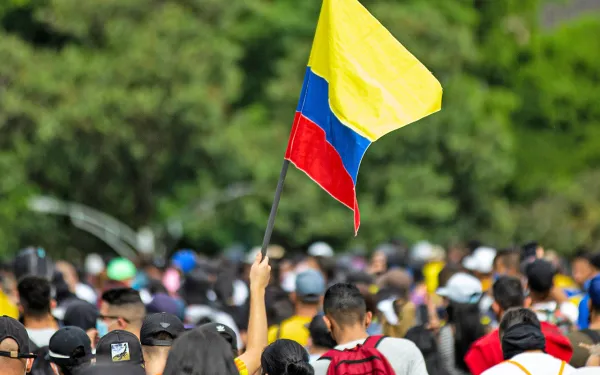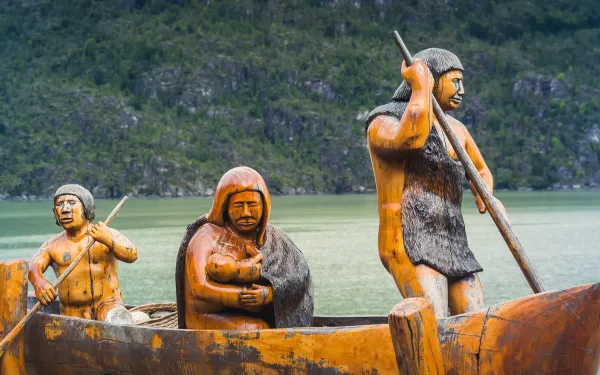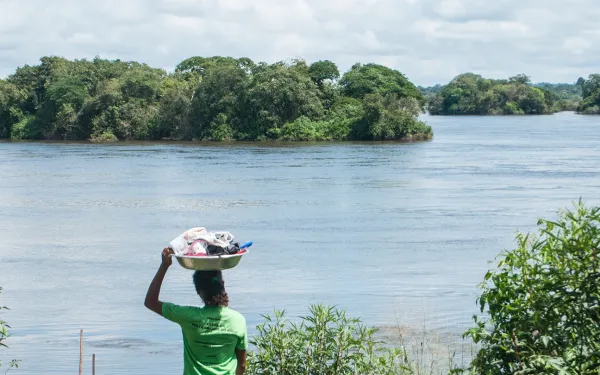
Project
Victory: Court ends the “lawful” killing of endangered green sea turtles
In February of 1999, the Constitutional Court in Costa Rica declared an end to the "lawful" killing of endangered green sea turtles. The ruling is an important victory for the green sea turtle and potentially other species left vulnerable by their host countries.
Costa Rica has the privilege and responsibility of being a haven for one of the largest remaining populations of this endangered species of marine turtle in the Atlantic Ocean. Every two or three years, female green sea turtles, many of which are decades old, slowly plod from their ocean homes to nest on a 35 kilometer long beach between the Tortuguero and Parismina River.
Costa Rica, rather than fully protecting these ancient guests, previously had a law allowing for the capture and slaughter of almost two thousand green sea turtles annually. Unfortunately, poachers exploited the law to kill many more than the legal limit, with the survival of the sea turtles jeopardized.
In response to inaction by the Costa Rican government, and to safeguard the survival of the green sea turtle, AIDA worked through its partner organization CEDARENA to file suit and challenge the law.
In the law suit, AIDA and CEDARENA argued that the law violated the Costa Rican constitutional guarantee of an environment that is healthy and “in ecological equilibrium.” We presented hard evidence of the hidden impact of the law on the sea turtles. The Court ruled in our favor, and annulled the law.
The ruling itself does not end the threat to green sea turtles. It may however, provide some breathing room for conservationists to concentrate on stopping illegal poaching. Hopefully, they will succeed.
Related projects

Statement on the abuses of security forces during the repression of social protest in Colombia
In the last week, protests in Colombia over a proposed tax reform have spurred a national mobilization against poverty and inequality, to which the Colombian government has reacted with repression, extreme violence and assassinations. The Interamerican Association for Environmental Defense (AIDA) emphatically rejects the abuses of security forces and expresses our deep concern about the lack of guarantees for social protest in Colombia. According to reports from national and international organizations, in recent days dozens of people have lost their lives in the context of state repression and hundreds more have been injured. We categorically condemn the extreme use of force against demonstrators and demand that the lives and rights of all citizens be respected. Liliana Ávila, AIDA human rights attorney and Colombian citizen, states: "Faced with the worrying escalation of violence, and the abuse of public force to silence social demonstrations, it is urgent that the Colombian state respect the human rights of protesters and create democratic and participatory spaces in which effective responses can be given to the conditions of poverty, marginalization and exclusion that are at the root of these protests." "All people have the right to demonstrate, and it is the State’s responsibility to create effective mechanisms for public participation. It’s extremely worrying that the State, instead, has taken repressive measures incompatible with the rule of law, severely restricting people's freedoms, and violating their right to life and personal integrity, while promoting language that stigmatizes and criminalizes protesters". We call on the international community and urge the Inter-American Commission on Human Rights to demand that the Colombian State respect the human rights of the protesters.
Read more
Chile: Report Finds That Approval of Salmon Farms in Kawésqar National Reserve is Illegal
The document prepared by national and international organizations highlights the incompatibility between this type of industry and the purpose of protection of the area. Even without an established management plan, there are already 57 salmon farming concessions, 113 in process and 6 resolutions of environmental qualification have been approved after the creation of the Reserve. Local communities in the area of the Kawésqar National Reserve—including Kawésqar Atap, As Wal Lajep, Grupos Familiares Nómades del Mar, Residentes Río Primero and Inés Caro—provided Chile’s National Forestry Corporation (CONAF) with a technical report that seeks to provide information on the serious impact that the salmon industry generates on marine ecosystems. Prepared by the NGOs FIMA, Greenpeace and AIDA (the Interamerican Association for Environmental Defense), the report will be considered in the management plan that the government entity must develop and implement to comply with the protection of the marine waters that make up the Reserve. "CONAF must guarantee compliance with what was established in the Indigenous Consultation and explicitly prohibit salmon farming in the reserve's management plan. This definition is key to the future health of the Patagonian marine ecosystems," explained Estefanía González, Greenpeace's Campaign Coordinator. "Salmon farming is completely incompatible with the maintenance of healthy marine ecosystems." Historic process for the protection of the Southern seas The creation of the Kawésqar National Reserve in 2018 was a key milestone for the participation of these native people in decision-making regarding the ecosystems that make up their ancestral territory. On that occasion, through indigenous consultation, the need to protect the waters and prevent the development of activities such as salmon farming was expressly established, considering the particular situation of fragility of the area and the Kawésqar cultural legacy, firmly linked to the sea. In their above referenced report, the organizations conclude that salmon farming as an activity is incompatible with the protection objectives of National Reserves, from a legal and ecosystemic point of view, and in particular with the Kawésqar National Reserve, due to the many risks involved. Among the damages caused by this industry are biological contamination caused by the introduction of exotic species, the indiscriminate use of antibiotics, periodic massive salmon escapes, and the food and feces deposited on the seafloor, which generate anaerobic conditions and red tides. All of the above endangers a marine area with unique diversity and which the State itself has decided to protect. "Allowing salmon farming in the Kawésqar National Reserve would render the protection given to the area useless," added Victoria Belemmi, FIMA attorney. "This point has even been recognized by the national directorate of CONAF, which when consulted in 2019 by the comptroller's office on salmon farming within protected areas, pointed out that according to the current national and international legal framework, including the Washington Convention, an activity such as salmon farming would not be admissible in an area designed to protect the marine ecosystem." Statement from the Comptroller's Office For its part, AIDA filed a letter with the Comptroller General's Office to solicit a ruling on the approval of a project to increase the biomass of a salmon farming center located in the Alacalufes Reserve, now Kawésqar National Reserve, which was operating under anaerobic conditions. "The approval of this project meant that salmon production was authorized to increase in an area where there was already evidence that the carrying capacity of the site was exceeded," explained Florencia Ortúzar, AIDA attorney. "The fact that the center was located in the waters bordering the Alacalufes Reserve (now Kawésqar) makes it even more serious." The low level of oxygen affecting the waters was evidenced by official documentation recognizing the regulations for that purpose—the Preliminary Site Characterization that the center's owner submitted to request the expansion, and several preliminary reports (INFA) confirming the situation. With the approval, the center acquired authorization to almost triple its original production. Subpesca had noted the situation, even interposing an observation on the matter within the process. However, shortly thereafter, it issued its approval of the project. Subsequently, the Environmental Evaluation Service (SEA) approved the project by means of an Environmental Qualification Resolution (RCA, for its Spanish initials). Read the report here (in Spanish) press contact Victor Quintanilla (Mexico), AIDA, [email protected], +5215570522107
Read more
Human Rights Council addresses the water crisis and environmental defenders protection
The 46th session of the United Nations Human Rights Council is the first to be held entirely online, due to the COVID-19 pandemic. It runs until March 23. The virtual format of this HRC session enabled AIDA to make our first participation ever in the HRC and join the discussions on two of the topics that are at the core of its human rights work: the right to a healthy environment and the protection of environmental human rights defenders. On 03 March, the Special Rapporteur on Human Rights and the Environment, David Boyd, presented his report “Human Rights and the Global Water Crisis” to the Human Rights Council. In it, Boyd highlighted the severe impacts of water pollution, water scarcity and water-related disasters on the rights to life, health, education, food, development and the right to a healthy environment. He also emphasized that climate change is a risk-multiplier, exacerbating water-related human rights issues. The Special Rapporteur called on States to incorporate a rights-based approach in both their climate strategies and water plans. Finally, Boyd reiterated his call for the Human Rights Council to support the initiative for a resolution to recognize that everyone everywhere has the right to live in a safe, clean, healthy and sustainable environment. In the Interactive Dialogue that followed Boyd’s presentation, AIDA Attorney Rosa Peña denounced the negative impacts of mega-dams, coal mining and fracking on human rights and water access in Latin America. She noted that these projects not only threaten the human rights of local communities but also exacerbate the climate crisis. She called the attention of the Special Rapporteur to the communities affected by the Belo Monte mega-dam in the Brazilian Amazon. Currently, implementation of the so-called ‘Consensus Hydrogram’ in the Xingu River threatens the lives of local communities, pollutes the water, dries up the river and causes food insecurity and severe biodiversity loss. On March 4, it was the turn of the Special Rapporteur on Human Rights Defenders, Mary Lawlor, to engage in an Interactive Dialogue on ”Final warning: death threats and killings of human rights defenders” She concluded that lack of political will is one of the reasons why various States fail in their moral and legal obligation to protect Human Rights Defenders, and therefore called for more effective responses to the threats against them. Representing AIDA in the Interactive Dialogue, Attorney Marcella Torres highlighted that Latin America is the most dangerous region in the world for environmental human rights defenders and urged all States to actively protect them. She turned the spotlight on the situation of environmental defenders in Brazil, Guatemala and Colombia, where the invasion of indigenous lands, mega-dams and fracking are closely related to the increase in violence against defenders. She concluded by reminding States that the protection of environmental defenders should promote the recognition of the right to a healthy environment, and provide guarantees so that all people are free to exercise their right to defend human rights. See AIDA’s contributions in the Interactive Dialogues in full:
Read more